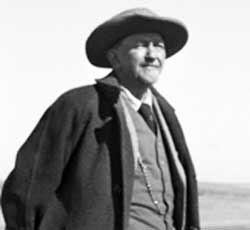
(1873 — 1938)

He was born on 29 June 1873 in Berlin to a Prussian officer ; he died 9 August 1938 in Biganzolo, Lago Maggiore, Piedmont, Italy. The Frobenius-Institut in Frankfurt is named for him.
Frobenius undertook his first expedition to Africa in 1904 to the Kasai district in Congo, formulating the African Atlantis theory during his travels. Until 1918 he travelled in the western and central Sudan, and in northern and northeastern Africa. In 1920 he founded the Institute for Cultural Morphology in Munich. In 1932 he became honorary professor at the University of Frankfurt, and in 1935 director of the municipal ethnographic museum.
In 1897/1898 Frobenius defined several “culture areas” (Kulturkreise), cultures showing similar traits that have been spread by diffusion or invasion. With his term paideuma, Frobenius wanted to describe a gestalt, a manner of creating meaning (Sinnstiftung), that was typical of certain economic structures. Thus, the Frankfurt cultural morphologists tried to reconstruct “the” world-view of hunters, early planters, and megalith-builders or sacred kings. This concept of culture as a living organism was influenced by the theories of Oswald Spengler.
Frobenius taught at the University of Frankfurt. In 1925, the city acquired his collection of about 4700 prehistorical African stone paintings, which are currently at the University's institute of ethnology, which was named the Frobenius Institute in his honour in 1946.
His writings with Douglas Fox were a channel through which some African traditional storytelling and epic entered European literature. This applies in particular to Gassire's lute, an epic from West Africa which Frobenius had encountered in Mali. Ezra Pound corresponded with Frobenius from the 1920s, initially on economic topics. The story made its way into Pound's Cantos through this connection.
In the 1930s, Frobenius claimed that he had found proof of the existence of the lost continent of Atlantis. Due to his studies in African history, Frobenius is a figure of renown in many African countries even today. In particular, he influenced Léopold Sédar Senghor, one of the founders of Négritude, who once claimed that Frobenius had “given Africa back its dignity and identity.” Aimé Césaire also quoted Frobenius as praising African people as being “civilized to the marrow of their bones”, as opposed to the degrading vision encouraged by colonial propaganda.
On the other hand, Wole Soyinka, in his 1986 Nobel Lecture, criticized Frobenius for his “schizophrenic” view of Yoruba art versus the people who made it. Quoting Frobenius's statement that “I was moved to silent melancholy at the thought that this assembly of degenerate and feeble-minded posterity should be the legitimate guardians of so much loveliness,” Soyinka calls such sentiments “a direct invitation to a free-for-all race for dispossession, justified on the grounds of the keeper's unworthiness.”
[ Home | States | Countries | Societies | Library | Blog | Search ]